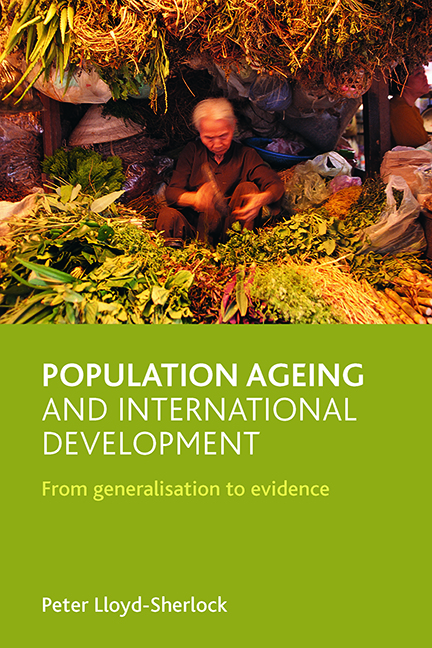Book contents
- Frontmatter
- Contents
- List of abbreviations
- Acknowledgements
- Notes on the author
- Introduction
- one International development and population ageing
- two Experiencing later life in contexts of development
- three Older people, pensions and development
- four Population ageing and health
- five Later life and social relations: family, migration and care
- six Ageing and development in South Africa
- seven Ageing and development in Argentina
- eight Ageing and development in India
- nine Conclusions and overview
- References
one - International development and population ageing
Published online by Cambridge University Press: 15 July 2022
- Frontmatter
- Contents
- List of abbreviations
- Acknowledgements
- Notes on the author
- Introduction
- one International development and population ageing
- two Experiencing later life in contexts of development
- three Older people, pensions and development
- four Population ageing and health
- five Later life and social relations: family, migration and care
- six Ageing and development in South Africa
- seven Ageing and development in Argentina
- eight Ageing and development in India
- nine Conclusions and overview
- References
Summary
Population ageing is unprecedented, without parallel in the history of humanity…. Population ageing is pervasive, a global phenomenon affecting every man, woman and child…. Population ageing is profound, having major consequences and implications for all facets of human life.
(United Nations Population Division, 2002: xxviii)Introduction
Population ageing is now recognised as a major issue for international development; at the same time, processes associated with development strongly influence how later life is experienced around the world. This chapter explores relationships between development, demographic change and population ageing. It begins by briefly outlining what is meant by ‘development’, drawing attention to the concept's complexity and differences in interpretation. The chapter goes onto explore links between development and population change, identifying different scenarios with particular implications for population ageing. The second half of the chapter reviews current knowledge about how population ageing may feed back into development. This discussion questions the widely held view that ageing is a threat to economic performance. It also considers impacts on other aspects of development, including political change.
What is development?
To assess the effects of population ageing on development, and how development influences the lives of older people, we first need to have some understanding of what is meant by ‘international development’. This is not an easy task: the concept can be interpreted in very different ways and these views have changed radically over time. Without getting into the detail of these complex and important debates, this section will map out some key issues and consider their implications for the central themes of this book.
The most basic (and least helpful) interpretation of ‘international development’ is a crude shorthand for a particular concern with the so-called ‘developing regions’. Focusing exclusively on these regions is, however, highly problematic in a number of ways. First, any distinction between a less-developed region or country and a more developed one is somewhat arbitrary, particularly at the margins. For example, it is unclear whether many formerly socialist countries belong in one camp or the other. Second, it implies a neat, polarised distinction between conditions prevailing in developing and developed countries, and this goes on to imply that it is safe to make generalisations about older people in one set of countries vis-à-vis the other set.
- Type
- Chapter
- Information
- Population Ageing and International DevelopmentFrom Generalisation to Evidence, pp. 1 - 34Publisher: Bristol University PressPrint publication year: 2010



